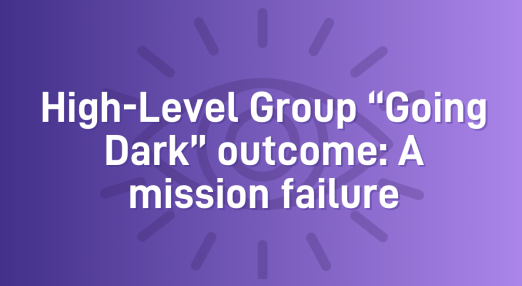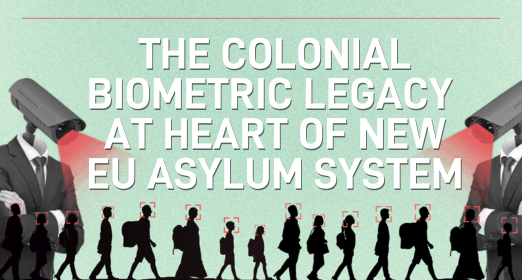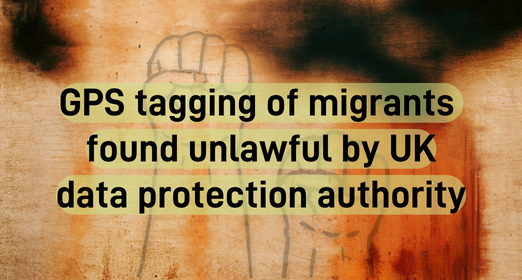Migrant smuggling laws: European Commission found in breach of transparency rules
The European Ombudsman has found that the Commission disregarded important transparency rules while preparing the Europol Regulation, which is a part of the legislation to "counter migrant smuggling". The inquiry concluded that the Commission didn't provide enough evidence to justify the claims of "urgency" to bypass their own 'Better Regulation' rules, and skipping public consultations, thorough impact assessments and evidence gathering.
Filter resources
-

Migrant smuggling laws: European Commission found in breach of transparency rules
The European Ombudsman has found that the Commission disregarded important transparency rules while preparing the Europol Regulation, which is a part of the legislation to "counter migrant smuggling". The inquiry concluded that the Commission didn't provide enough evidence to justify the claims of "urgency" to bypass their own 'Better Regulation' rules, and skipping public consultations, thorough impact assessments and evidence gathering.
Read more
-

EU adopts Digital Trade Agreement with Singapore despite warnings: a setback for digital rights and democratic oversight
The European Parliament has approved the EU–Singapore Digital Trade Agreement, rejecting a motion to seek a Court of Justice opinion on its legality. This decision weakens the Union’s capacity to safeguard privacy, data protection, and accountability over software systems, at a time when deregulation pressures are increasing across Europe.
Read more
-

The EU must stop the digitalisation of the deportation regime and withdraw the new Return Regulation
The European Commission’s new legislative proposal for a deportation regulation fuels detention, criminalisation, and digital surveillance. The #ProtectNotSurveil coalition is demanding the end of the deportation regime and for the Commission to withdraw its proposal.
Read more
-

LIBE vote on Europol reform blow to the Commission, but still legitimises an expanding surveillance regime
European Parliament's LIBE committee vote on a reform of the Europol Regulation was a mixed bag. Although it was a blow to the European Commission's original proposal, it still legitimised an expanding surveillance regime thanks to Europol's ever-growing power and resources. Read the Protect Not Surveil coalition’s statement.
Read more
-

UK data adequacy under scrutiny: civil society warns EU not to reward deregulation disguised as ‘simplification’
Civil society organisations, including EDRi and EDRi members Open Rights Group and Privacy International, are urging the European Commission not to re-adopt the UK’s data adequacy decisions without meaningful reform. The UK’s rollback of protections under the guise of ‘simplification’ puts the level of protection required by the General Data Protection Regulation (GDPR) and Court of Justice of the European Union (CJEU) case law at risk and exposes the Commission’s decisions to legal challenge.
Read more
-

Digital trade: the new frontline in the fight for our rights
The EU is signing digital trade deals that could undermine fundamental rights and block oversight of software systems shaping our lives. From data protection to algorithmic accountability, these agreements risk empowering opaque systems - used by both companies and governments - at the expense of the people most affected by them.
Read more
-

Protect Not Surveil position paper: Stop Europol’s expanding digital surveillance against migrants!
EDRi and the Protect Not Surveil coalition published position paper today to call for the rejection of the Europol reform. The proposed legislation would expand Europol’s surveillance powers, put lives at risk, and criminalise migrants and solidarity organisers.
Read more
-

Civil society raises concerns over Europol-Egypt cooperation agreements
41 civil society organisations and experts sound the alarm about negotiations on a working agreement between Europol and Egypt. If signed it would risk legitimising illegal practices used by Egyptian police and pave the way for an exchange for personal data.
Read more
-

High-Level Group “Going Dark” outcome: A mission failure
On 13 June, the Justice and Home Affairs Council, composed of EU Member States’ ministers of the Interior, will discuss the recommendations of the High-Level Group (HLG) on Access to Data for Effective Law Enforcement (“Going Dark”). This blogpost provides a short analysis of the HLG’s recommendations and a summary of its procedural flaws.
Read more
-

Resist Europol Document Pool
This document pool gathers all the relevant documentation regarding Europol’s powers and legislative reforms, critical analysis and research as well as tools for action.
Read more
-

The colonial biometric legacy at heart of new EU asylum system
On Wednesday (10 April), the EU is set to vote on a new set of asylum and migration reforms. Among the many controversial changes proposed in the new migration pact, one went almost unnoticed — a seemingly innocent reform of the EU's asylum database, EURODAC. Although framed as purely technical adjustments, the reality is far more malicious. The changes to EURODAC will massively exacerbate violence against people on the move.
Read more
-

GPS tagging of migrants found unlawful by UK data protection authority
As a result of Privacy International’s 2022 complaint against the UK Home Office, the UK data protection authority (ICO) has found that the GPS tagging of migrants and asylum seekers arriving to the UK small boats was unlawful, and issued a formal warning for all future data protection compliance of GPS tagging as a whole. This is a major step towards better scrutiny of the human rights implications of the surveillance of migrants.
Read more
